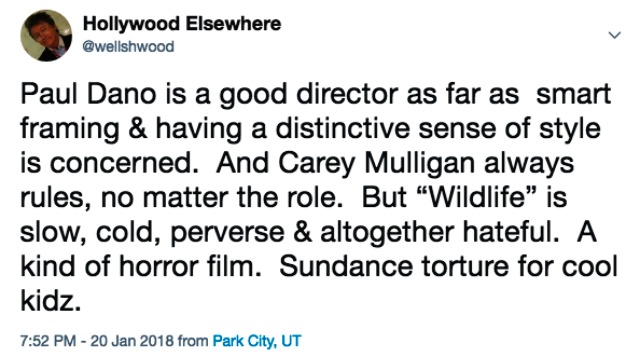A 1960-era drama based on a Richard Ford novel, Wildlife (IFC Films, 10.19) is about ennui, loneliness and infidelity. It’s set in Montana and is specifically about 30something Jeanette (Carey Mulligan) and her strained relationship with unemployed hubby Jerry (Jake Gyllenhaal) after he leaves the household to fight a nearby forest fire. The story is mostly about Jeanette’s decision to slip into a diseased affair with an older, Uriah Heep-like rich guy (Bill Camp) and how this traumatizes her 14 year-old son Joe (Ed Oxonbould).
In my 1.20.18 Sundance Film Festival review I wrote that I was “appalled — astonished — by the cruel, self-destructive behavior of this sad 34 year-old woman, and particularly by her decision to invite her son to almost participate in some extra-marital humping with a rich, small-town fat guy while her doltish husband is off fighting a forest fire.

“Yes, the screenplay (co-authored by director Paul Dano and Zoey Kazan) is an adaptation of Ford’s 1990 novel so blame Ford, right? But who dreams up stuff like this? And what kind of mother has ever injected this kind of sexual poison into her son’s life?
“Infidels hide their affairs, particularly from their kids. But Jeanette more or less whispers in her son’s ear, ‘I dunno but I kinda like this balding toad…he’s rich and definitely not your father, and so I’m feeling a bit flirty and thinking about…well, I’ve said enough.’ And the kid just stares at her like she’s some kind of ghoul from a Vincent Price flick.
Later she says she’s miserable and almost ready to kill herself, but that doesn’t negate the earlier thing.”
Well, the night before last Wildlife screened at the New York Film Festival, and lo and behold someone in the audience had the same reaction as I did. Instead of asking a typical obsequious question the viewer voiced displeasure at Jeanette’s behavior. The nerve!
Paul Sharf‘s 10.2 Indiewire story reports that the “audience member” — a guy — “addressed Mulligan and criticized her character for being ‘completely reprehensible‘ and ‘unsympathetic.’ Mulligan’s response was that the guy was man-complaining — that his rigid preconceptions were getting in the way and that he needed to get past himself.
“We’re all too used to only seeing women behaving really well [in movies],” Mulligan said. “When we see them out of control or struggling it doesn’t ring true because of everything we’ve been brought up to understand that women are always perfect and can do anything. That’s an unrealistic expectation of a woman. Seeing real humanity on-screen can be really jarring from a female perspective.”
HE to Mulligan: If Wildlife had been about a youngish mom leaving her husband and young son in order to take a job in another city or whatever, and if the father had soon after decided to not only embark on an affair with an older woman but invite his son to participate in this indiscretion, I would be just as turned off to Wildlife, and so would that guy who complained the other night — trust me.
The ugliness isn’t about being unhappy or depressed or having an affair — that’s normal. The ugliness is in smearing the aroma of adult carnality in some poor kid’s face.
Sharf has described the question as “an unfortunate moment.” Perhaps other New York Film festival attendees will read this story and take heed. Questions for filmmakers have to be kiss-assy at all times.









